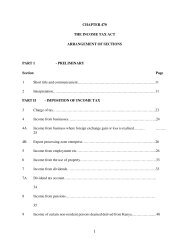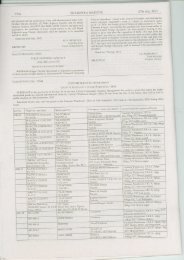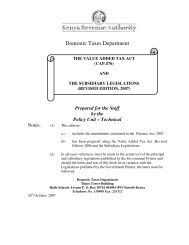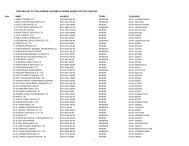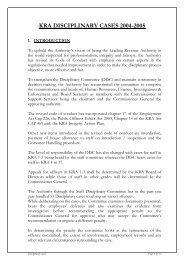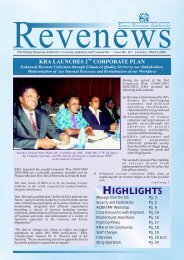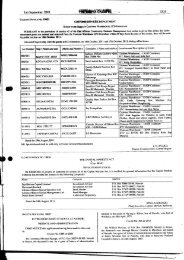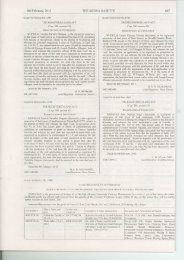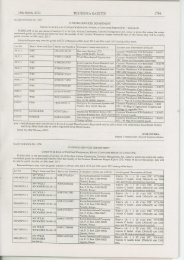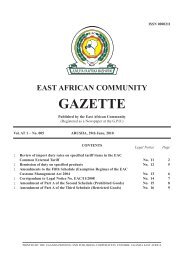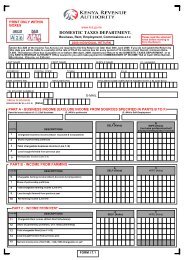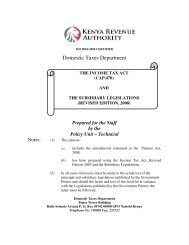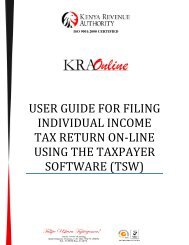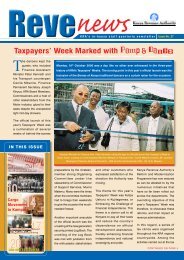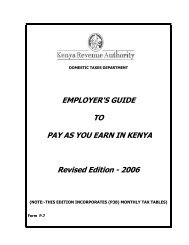INCOME TAX AT A GLANCE.cdr - Kenya Revenue Authority
INCOME TAX AT A GLANCE.cdr - Kenya Revenue Authority
INCOME TAX AT A GLANCE.cdr - Kenya Revenue Authority
Create successful ePaper yourself
Turn your PDF publications into a flip-book with our unique Google optimized e-Paper software.
Tulipe Ushuru Tujitegemee<br />
<strong>INCOME</strong> <strong>TAX</strong> <strong>AT</strong> A <strong>GLANCE</strong><br />
2011 - 2012<br />
DOMESTIC <strong>TAX</strong>ES DEPARTMENT<br />
ISO 9001:2008 CERTIFIED
Our Vision<br />
To be the leading <strong>Revenue</strong> <strong>Authority</strong><br />
in the world Respected for Professionalism<br />
Integrity and Fairness<br />
Our Mission<br />
To promote compliance with <strong>Kenya</strong>'s tax,<br />
trade and border legislation and regulation by<br />
promoting the standards set out in the<br />
Taxpayer's Charter and responsible enforcement<br />
by highly motivated and professional staff<br />
thereby maximizing revenue collection at the<br />
least possible cost for the socio-economic well<br />
being of <strong>Kenya</strong>ns.
CONTENTS<br />
PAGE<br />
1. Introduction 2<br />
2. Scope of Tax 2<br />
3. Personal Identification Number (PIN) 2<br />
4. Self - Assessment Return 2<br />
5. Methods of collecting Tax 3<br />
6. Tax Incentives. 6<br />
7. Penalties 10<br />
8. Dispute Resolution 12<br />
9. Refunds 13<br />
10. Operations - Tax Programmes 13<br />
I N C O M E T A X A T A G L A N C E 1
INTRODUCTION<br />
Taxation of Income in <strong>Kenya</strong> is governed by the provisions of the Income Tax<br />
Act (Cap. 470 - Laws of <strong>Kenya</strong>), which was enacted in January, 1974.<br />
SCOPE OF <strong>TAX</strong><br />
Income Tax is a direct tax imposed on:<br />
• Business Income,<br />
• Employment income, including benefits,<br />
• Rent Income,<br />
• Pensions, and<br />
• Investment income, among others.<br />
PERSONAL IDENTIFIC<strong>AT</strong>ION NUMBER (PIN)<br />
This is a unique computer generated Personal Identification Number<br />
assigned to every person with Income chargeable to Tax.<br />
The Law requires every person with chargeable Income to obtain PIN. PIN<br />
may be generated through KRA Online Services. The law also makes it<br />
mandatory to have the PIN for certain transactions listed in the Act, such as<br />
motor vehicle transfers, clearance of goods with Customs Services<br />
Department, installation of water and electricity meters.<br />
SELF - ASSESSMENT RETURN<br />
This is a form in which a taxpayer is required to declare income and<br />
compute tax liability. The Self Assessment Return should be completed and<br />
2<br />
I N C O M E T A X A T A G L A N C E
submitted to Commissioner, Domestic Taxes Department.<br />
• Individuals (Employees and Sole proprietors), Partnerships: The return<br />
of income and Accounts for any year of income should be submitted on<br />
or before 30th June of the following year. For example, the return of<br />
Income and Accounts for 2009 is due on or before 30th June 2010.<br />
• Corporate Taxpayer e.g. Limited Companies, Trusts, Cooperatives,<br />
etc: - On or before the last day of the sixth month after the end of the<br />
accounting period.<br />
Note:-<br />
For all categories of Taxpayers, where no return of income was issued to the<br />
Taxpayer by the Commissioner, the Taxpayer is required by law to obtain<br />
one from the nearest Domestic Taxes Office or download from KRA<br />
Website, complete it, compute and pay the tax liability and submit the return<br />
to the Commissioner by the due date. Taxpayers are however encouraged<br />
to file their returns Online as this is the current procedure.<br />
METHODS OF COLLECTING <strong>INCOME</strong> <strong>TAX</strong><br />
• Pay As You Earn (PAYE)<br />
• Withholding Tax<br />
• Installment Tax<br />
• Balance of Tax on Self Assessment<br />
• Advance Tax<br />
• Direct payments to the Commissioner of Domestic Taxes for tax<br />
arrears.<br />
I N C O M E T A X A T A G L A N C E 3
Pay as You Earn (PAYE)<br />
PAYE is a method of collecting tax at source from individuals in gainful<br />
employment. The employers will deduct tax according to the prevailing<br />
rates of tax from their employees' salary or wages on each payday for a<br />
month then remit the tax to the Central Bank of <strong>Kenya</strong> through the laid down<br />
procedure on or before the 9th day of the following month. The employee<br />
thus has no extra liability to pay at the end of the year unless he/she has<br />
income from other sources including other employments.<br />
The employers' Guide to PAYE and the Monthly PAYE Tax Tables are<br />
available free of charge at the Domestic Taxes Department, or from KRA<br />
Website.<br />
The Employer is encouraged to file monthly PAYE returns and generate<br />
payment E-slip through KRA Online Services.<br />
PAYE tax payment helps to spread the tax burden evenly for those in gainful<br />
employment, throughout the calendar year.<br />
Every individual in receipt of income liable to tax is entitled to a relief, known<br />
as "Personal Relief", granted against tax payable and is not refundable to<br />
Taxpayer.<br />
Unutilized personal relief can be carried forward from one month to<br />
another within the same calendar year but not from one year to another.<br />
Corporation Tax<br />
Corporation tax is a form of Income Tax that is levied on Corporate bodies<br />
such as Limited Companies, Trusts, and Co-operatives. Resident<br />
Companies are taxable at a rate of 30% while non-resident companies are<br />
taxable at the rate of 37.5% on taxable income.<br />
4<br />
I N C O M E T A X A T A G L A N C E
Installment Tax<br />
Installment tax is paid by both individual and corporate Taxpayers who have<br />
tax payable for any year, except in the case of those individuals whose tax<br />
liability for a particular year is fully covered under PAYE, or whose final tax<br />
liability does not exceed Kshs. 40,000/=. The installments are spread<br />
evenly @25% of the tax due and payable on or before the 20th day of the<br />
4th, 6th, 9th, and 12th months of the year of income for all Taxpayers<br />
except those in the Agricultural sector whose installments are paid @ 75% in<br />
the 9th month and 25% in the 12th month.<br />
Balance of Tax on Self - Assessment<br />
Payable on or before the last day of the fourth month following the end of<br />
year of income or accounting period.<br />
Withholding Tax<br />
Withholding Tax is deducted at source from the following sources of<br />
income:-<br />
• Interest,<br />
• Dividends,<br />
• Royalties,<br />
• Management or Professional or Training and Contractual fees,<br />
• Commissions,<br />
• Pensions,<br />
• Rent received by non-resident person,<br />
• Other payments specified.<br />
I N C O M E T A X A T A G L A N C E 5
Withholding Tax rates vary on each of the above-mentioned types of<br />
income depending on whether the recipient of the income is a resident or<br />
non-resident. The payer of the income mentioned is responsible for<br />
deducting and remitting the tax to the Commissioner on or before the 20th<br />
day of the following month.<br />
Advance Tax<br />
Advance tax was introduced in January, 1996 specifically to bring owners of<br />
Public Service and Commercial vehicles into the tax net. It is not a final tax,<br />
but a tax paid in advance before public service vehicles or commercial<br />
vehicles are licensed. The rates applicable are specified below:-<br />
• For Vans, Pick-ups, Trucks and Lorries, Kshs. 1,500 per ton of load<br />
capacity per year or Kshs. 2,400 whichever is higher.<br />
• For Saloons, Station Wagons, Mini-buses, Buses and Coaches, Kshs<br />
60 per passenger capacity per month (Ksh. 720 per passenger per<br />
year) or Kshs. 2,400 per year whichever is higher.<br />
Note:<br />
All those who pay Advance Tax must file returns to Commissioner, Domestic<br />
Taxes Department. Credit for the Advance Tax paid will be granted at the<br />
time of processing the returns.<br />
<strong>TAX</strong> INCENTIVES<br />
The following are tax incentives offered by the Department:<br />
Capital Deductions<br />
Capital Deductions are incentives to investors on the capital expenditure<br />
incurred on Industrial buildings and purchase of machinery used for the<br />
production of income. Capital deductions are made on expenditure in<br />
6<br />
I N C O M E T A X A T A G L A N C E
espect of the following;<br />
a) Wear and tear allowances (on declining balance) in respect of:-<br />
i) Tractors, Combine Harvesters, Heavy earth-moving equipment<br />
and similar Heavy self propelling machinery, 37.5%.<br />
ii) Other self-propelling vehicles including aircrafts; 25%<br />
iii) Other machinery including ships; 12.5%<br />
iv) Computers and peripheral computer hardware, calculators,<br />
copiers and duplicating machines; 30%<br />
v) Purchase of software and cost of license for the acquisition of rights<br />
in a software; 5%<br />
vi) Telecommunication Equipment purchased and used by a<br />
telecommunication operator ;- 20%.<br />
vii) Purchase or acquisition of an indefeasible right to use a fibre optic<br />
cable by a telecommunication operator; 20%.<br />
b) Industrial Building Allowance (on straight line) in respect of<br />
capital expenditure on:<br />
(i) Hostels and Educational buildings - 10% w.e.f. 1st January, 2007.<br />
Educational Buildings, Hostels and Training facilities:- 50% w.e.f.<br />
1st January, 2010.<br />
(ii) Other Industrial Buildings - 10% w.e.f 1st January, 2010.<br />
(iii)Straight line deduction of the expenditure on machinery and<br />
structures such as roads, bridges and similar infrastructure over the<br />
I N C O M E T A X A T A G L A N C E 7
concessioning period (e.g. Rift Valley Railways).<br />
(iv) Commercial buildings where the cost of roads, sewage, power and<br />
social infrastructure are borne by the Investor; 25% w.e.f 1st<br />
January, 2010<br />
c) Farm Works Allowance (on straight line basis) in respect of<br />
capital expenditure incurred on a farm:- 50% Farm works<br />
allowance w.ef. 1st January, 2007. 100% Farm works allowance<br />
w.e.f 1st January, 2011.<br />
d) Investment Allowance (once only at a given percentage) in<br />
respect of capital expenditure in the:-<br />
(i) Hotel sector on the buildings, which are certified as Industrial<br />
Building under the Act; 100%<br />
(ii) Ordinary manufacturing sector on both machinery and buildings;<br />
100%;<br />
(iii)Manufacture under bond sector on both machinery and buildings<br />
(Nairobi, Mombasa, Kisumu, Thika, Nakuru, Nyeri or within the<br />
immediate environs of these towns); 100%.<br />
(iv) Shipping sector for resident ship owners on ships of more than 495<br />
tons; -40%.<br />
(v) Capital Equipment purchased and used by a local film producer;-<br />
100%.<br />
(vi) Investment in construction of a building or purchase of machinery<br />
whether used for purposes of manufacture or not within satellite<br />
towns around major cities of Nairobi, Mombasa and Kisumu;-<br />
150%.<br />
8<br />
I N C O M E T A X A T A G L A N C E
Note:<br />
The Investment should be worth Kshs. 200 million and above.<br />
Export Processing Zones (EPZ)<br />
Enterprises operating within the EPZ's enjoy the following benefits:<br />
I) 10 years tax holiday giving exemption from corporation tax for the first<br />
10 years of trading.<br />
ii)<br />
A lower corporation tax rate of 25% for the subsequent 10 years.<br />
iii) Exemptions from all withholding tax on dividends and other payments<br />
to non-residents during the first 10 years of trading.<br />
iv) Investment Deductions @100% of capital expenditure claimable in the<br />
11th year after commencement of production.<br />
Note:<br />
(i)<br />
(ii)<br />
Notwithstanding the above, EPZ Enterprises must submit Annual<br />
returns of Income and supporting Accounts to the Commissioner of<br />
Domestic Taxes.<br />
Emoluments paid to employees and resident directors of EPZ<br />
Enterprises MUST be subject to deduction of PAYE as required by law<br />
even during the period the enterprise is exempt from tax.<br />
Tax Incentives for Individual Taxpayers:<br />
• Personal relief, Kshs.13944 per annum.<br />
• Relief on premiums paid for Life Insurance, Education and Heath<br />
policy; 15% of premiums paid but not more than Kshs.60,000 per<br />
I N C O M E T A X A T A G L A N C E 9
annum.<br />
• Relief/deduction of interest paid on mortgage for owner occupied<br />
properties, subject to a maximum of 150,000/- per year.<br />
• Relief/deductions on funds deposited under a registered Home<br />
Ownership Savings Plan, subject to maximum of Kshs. 48,000 per<br />
year;<br />
• Tax exemption on contributions to registered pension and provident<br />
funds; Kshs.240,000 per annum w.e.f 1st January, 2006.<br />
• Tax exemption on employee where employer remits gratuity into a<br />
registered pension scheme. The tax exempt amount is<br />
Kshs.240,000/= per annum w.e.f January 2011.<br />
• Tax -free amount on retirement is Ksh.600,000/= w.e.f 1st January,<br />
2010.<br />
• Annual pension is tax free up to a maximum of Kshs.300,000/= per<br />
annum w.e.f 1st January, 2010.<br />
• Monthly or lump sum pension granted to a person who is 65 years or<br />
more is tax exempt w.e.f 13th June,2008.<br />
7. PENALTIES<br />
All persons are required by law to submit their returns to the Commissioner<br />
of Domestic Taxes within 6 months after the end of the Accounting period.<br />
The balance of tax not paid through installments is payable on or before the<br />
last day of the 4th month after the end of the Accounting period. Failure to<br />
comply results in statutory penalties being charged which include fines<br />
and/or imprisonment.<br />
The following penalties will be charged for the following offences:-<br />
(i)<br />
(ii)<br />
For failure to furnish by the due date, a return of income in relation to<br />
any year, additional tax equal to five per cent of the normal tax.<br />
For omitting from any return of income any amount of income which<br />
should have been included therein, a penalty equal to double the<br />
difference between the tax chargeable according to the return made<br />
10<br />
I N C O M E T A X A T A G L A N C E
and the normal tax properly chargeable in respect of the total income<br />
assessable.<br />
(iii) For negligence or disregard of the law by a person who is an<br />
Authorized Tax Agent, and as a result, income is omitted as at (2)<br />
above. The Authorized Tax Agent shall be penalized to the extent of<br />
one half of the penalty at (2) above but in any case not less than Ksh.<br />
1,000 and not in excess of Kshs. 50,000 with respect to each return.<br />
(iv)<br />
For furnishing a return of income after due date:-<br />
Additional tax equal to 5% of the normal tax, or Kshs. 10,000 in case<br />
of Non Individual Taxpayers and Kshs. 1,000 in case of Individuals<br />
whichever is higher, for each period of 12 months or part thereof in<br />
which the delay occurs;<br />
(v) For failure to deduct or remit withholding Tax, a penalty equal to 10%<br />
of amount of tax involved is levied subject to a maximum penalty of<br />
Kshs. One million.<br />
(vi)<br />
For underpayment of installment tax:-<br />
a) A penalty of 20% chargeable on the difference between the amount<br />
of the installment tax payable in respect of a year of income and the<br />
installment tax actually paid.<br />
b) Where any amount of tax remains unpaid after the due date, a<br />
penalty of 20% is charged and shall immediately become due and<br />
payable.<br />
Note:<br />
The 20% penalty shall not apply to matters arising under Withholding<br />
tax or PAYE<br />
(vii) Interest on unpaid tax:-<br />
Calculated at the rate of 2% per month or part thereof on the principal<br />
tax<br />
I N C O M E T A X A T A G L A N C E 11
Note:<br />
Penalties levied under the Act do not attract interest.<br />
(viii) For failure to deduct PAYE, account for it or to supply the Commissioner<br />
with a certificate:-<br />
A penalty equal to 25% of the amount of the tax involved or Kshs.<br />
10,000 whichever is greater.<br />
(ix)<br />
(x)<br />
Personal Identification Number (PIN) related offence attracts Kshs.<br />
2,000/= per offence - e.g. not indicating PIN on return for proper<br />
identification.<br />
Turnover Tax (TOT) payers who fail to submit the quarterly Returns pay<br />
a default penalty of Kshs. 2,000/=<br />
DISPUTE RESOLUTION<br />
Should a Taxpayer be aggrieved by an Assessment raised by the<br />
Commissioner, the Income Tax Act allows room for resolution of disputes by<br />
way of:-<br />
(i)<br />
(ii)<br />
Raising an objection against the assessment within a specified period<br />
of time - 90 days from the date of issue of the assessment.<br />
Appealing against decision on the objection if aggrieved, to Local<br />
Committee, on matters of Law or mixed Law and Fact.<br />
(iii) Appealing against decision of the Local Committee to the High Court<br />
on matters of Law should there be no agreement arrived at on 1 & 2<br />
above<br />
Note:<br />
Before an Appeal to High Court is accepted, all outstanding tax must be<br />
paid in full.<br />
12<br />
I N C O M E T A X A T A G L A N C E
REFUNDS:<br />
Where a person makes a claim to the Commissioner of Domestic Taxes for<br />
refund of tax overpaid either through Installments, PAYE or Withholding Tax,<br />
etc., the Commissioner shall, on satisfying himself as to the validity of such a<br />
claim, cause the refund to be made to the person making such claim. The<br />
person can opt to have the refund or request for the amount to be utilized to<br />
clear a tax liability in another year or a tax liability in any other <strong>Kenya</strong><br />
<strong>Revenue</strong> <strong>Authority</strong> Department, and must inform the Commissioner in<br />
writing of the preferred option.<br />
<strong>TAX</strong> PROGRAMMES - OPER<strong>AT</strong>IONS<br />
Taxpayer Recruitment Programme - handles the recruitment of persons<br />
liable to tax but not registered with the Commissioner of Domestic Taxes.<br />
Return Processing - processes all returns received from Taxpayers.<br />
Non-filer programme - deals with Taxpayers who delay in submitting or<br />
fail to submit their returns.<br />
Taxpayer Audit Programme - deals with cases of under-declaration of<br />
taxable income.<br />
Debt Management Programme - Deals with Taxpayers who do not pay<br />
their taxes on time.<br />
DISCLAIMER<br />
This information is for guidance only and is subject to changes when the Law is amended. Any<br />
omissions do not absolve the Taxpayer from making true and correct returns and statementof<br />
Accounts.<br />
I N C O M E T A X A T A G L A N C E 13
For further information,<br />
Please visit the nearest KRA office<br />
Or<br />
Contact Taxpayer Education Programme<br />
On :-<br />
Tel: 020 2812010/2816095/2813068<br />
2813079/2812013<br />
Or<br />
KRA contact Call Centre, Tel.4999999<br />
DOMESTIC <strong>TAX</strong>ES DEPARTMENT<br />
HEAD OFFICE<br />
Times Tower Building 19th Floor<br />
Haile Sellasie Avenue<br />
P.O Box 30742-00100<br />
Nairobi<br />
Tel: 020-310900<br />
Website: www.kra.go.ke<br />
KRA Online Services Portal:www.kra.go.ke/portal<br />
DMG/DGW/Revised on 1st August, 2011



